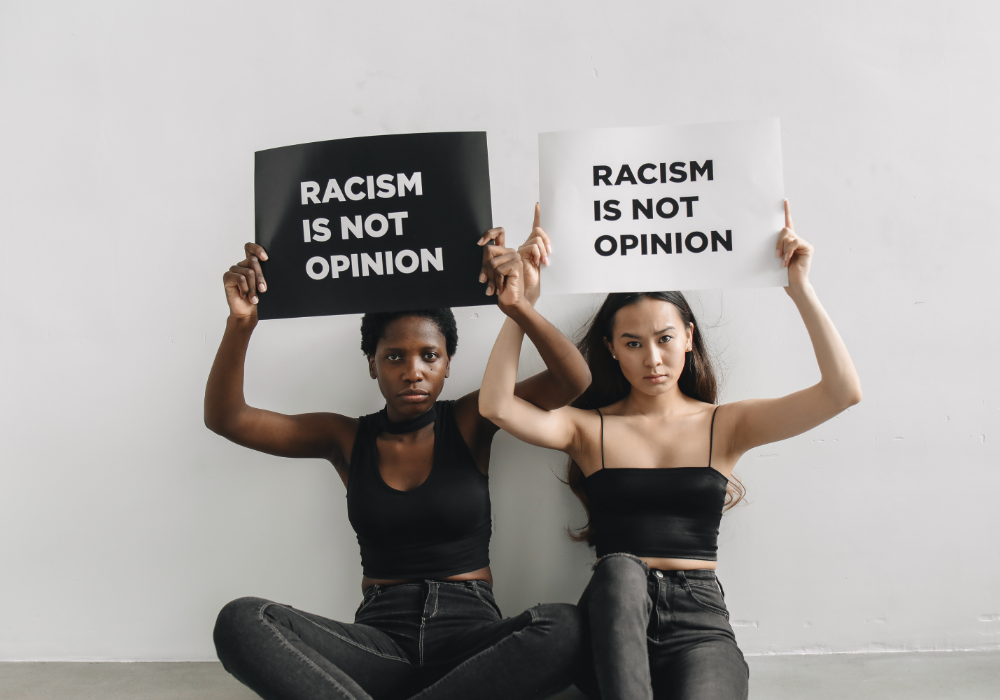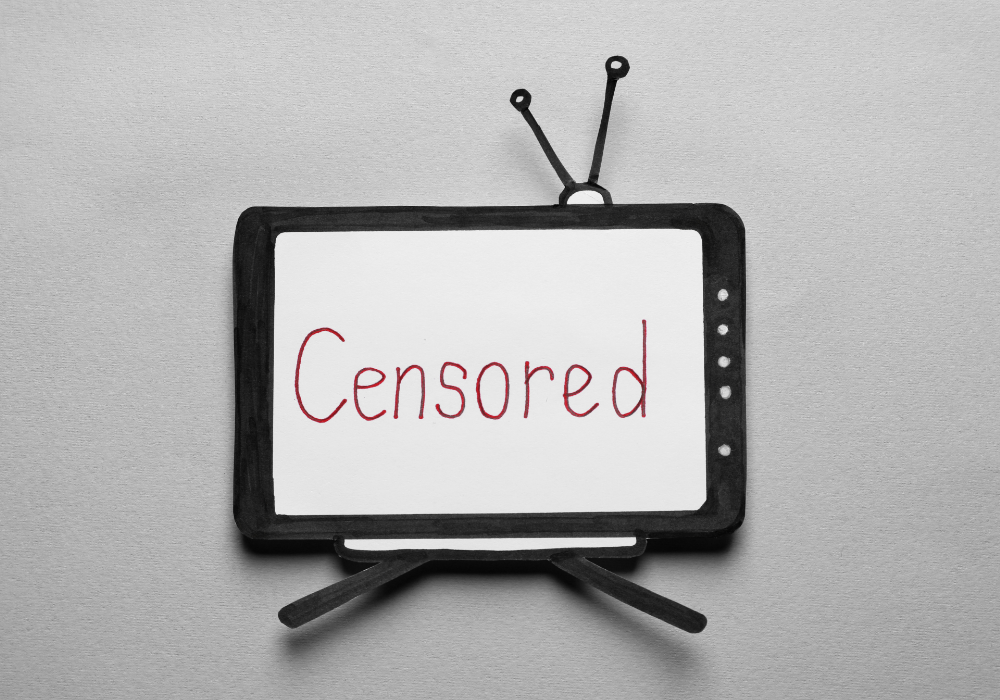The rules young people are writing are leading straight to repression.

The internet was supposed to be freedom’s playground—a place to explore, push limits, and leave old rules behind. For a while, it was. But when fear creeps in, America always races back to control. Prohibition turned panic into policy, banning alcohol in the name of public good but creating chaos instead. The Hays Code gutted Hollywood films for decades, silencing anything too daring or complex. These crackdowns follow a pattern, and we’re back in it now.
Once again, the lines are tightening. Fear of getting it wrong is everywhere, and the list of forbidden ideas keeps growing. Rules meant to protect are choking out freedom instead. The scariest part? We’ve seen this before, and we know how it ends. If we don’t call it out while there’s still time, we’ll find ourselves trapped in the same cycle—only this time, there might be no way back.
1. Fear of saying the wrong thing is draining conversations of honesty.

It’s not just that people are going quiet—it’s that conversations themselves are losing depth. Online spaces are full of hollow agreements and surface-level nods, where no one feels safe enough to dig deeper. Young people, in particular, have learned to stick to safe scripts. Robert Mark Simpson writes in the Political Philosophy Journal that fear of backlash drives people to self-censor, turning curiosity into a risk rather than an opportunity for open dialogue.
When people fear backlash, dialogue becomes performance. Instead of asking messy questions or challenging popular opinions, they parrot the safest takes just to stay above water. History has shown us what happens when fear drives conversation underground: power consolidates, while public life empties out. Without honest exchange, the ground softens for control to step in. Silence isn’t neutral—it’s an open door for repression.
2. Idealized traditional roles are becoming the new online aspiration for youth.

Recently, Mormon and “trad-wife” content has gained popularity online, promoting traditional gender roles and family structures as ideals. Jessica Grose explains in The New York Times that platforms like TikTok have become hotspots for the “tradwife” movement, which attracts young people looking for stability in an unpredictable world. The content often showcases women embracing motherhood, homemaking, and devotion to faith, presenting these roles as the key to fulfillment.
While this can feel comforting to some, it can also fuel a new moral panic. The pressure to adhere to rigid gender expectations can stifle individuality, reinforcing outdated societal norms. These movements, although framed as empowering, can subtly encourage a narrow view of what a meaningful life looks like, overshadowing other identities and life choices that challenge traditional boundaries.
3. Online call-outs have turned into public punishments.

What began as a way to call out real harm has spiraled into reactive chain reactions. According to Leila Hassan for Rock & Art, fear of becoming the next target drives people to join public outrage quickly, often before understanding the full context. This isn’t about holding individuals accountable; it’s about protecting oneself in a climate where pointing fingers first feels safer than staying silent.
These pile-ons happen fast, leaving no room for context or conversation. Genuine accountability should be about calling people in, not out, creating opportunities for growth and understanding rather than just punishment. But in the chaos of online outrage, that intent is often lost. What’s replaced is a culture of panic-fueled retribution, where we forget that people are capable of change. When fear drives the conversation, accountability gives way to mob mentality, making it harder to actually address harm in meaningful ways.
4. The rise of homophobia, racism, and sexism is poisoning online spaces.

As online platforms continue to evolve, so does the spread of harmful ideologies. What was once a space for diverse voices has increasingly become a breeding ground for homophobia, racism, and sexism.
Whether it’s through memes, viral videos, or comment sections, these toxic behaviors have found new ways to spread under the guise of humor or “free speech.” Social media platforms, while designed to connect people, have become hubs for online hate, where harmful stereotypes and discriminatory rhetoric are amplified.
This rise is fueled by echo chambers, where like-minded individuals validate each other’s harmful beliefs, creating a feedback loop of negativity. Young people, often more vulnerable to online influence, are exposed to these messages daily, normalizing hate and prejudice. As a result, these toxic ideologies are becoming increasingly normalized, poisoning the digital landscape and making it harder to foster inclusive, respectful communities.
5. Self-policing is creeping into private thoughts, not just public spaces.

The pressure to stay in line has moved beyond public behavior. It’s burrowed deep, shaping how people think long before they post or speak. Even in private, people second-guess their opinions, wondering if they’re safe, correct, or acceptable. Young people are learning to mentally audit themselves at every turn, editing not just what they say but what they even allow themselves to consider.
This goes further than fear of public backlash—it’s fear of internal deviation. People shrink their ideas to fit within invisible borders, until their thoughts feel too risky to follow through. This is how repression works best: not by force, but by training people to control themselves so thoroughly that no external punishment is even needed. The lines stay tight, even in the privacy of their own minds.
6. Online echo chambers are reinforcing narrow worldviews.

Social media algorithms are designed to show us content that matches our interests, which can trap many people, especially young users, in echo chambers. This means they’re constantly seeing ideas and opinions that align with what they already believe. Instead of challenging those beliefs or offering different perspectives, platforms focus on keeping people engaged by showing content they’re most likely to agree with. This creates a cycle where opposing views struggle to break through, and critical thinking gets pushed aside.
The effects of these echo chambers are significant. When people are only exposed to similar viewpoints, it becomes harder to understand other perspectives or have meaningful conversations. This lack of diversity in what we see online not only limits personal growth but also deepens divides in society. When everyone stays within their own bubble, it’s harder to make progress on common issues and find solutions together.
7. Fear of sexuality is bringing back old-school repression.

There’s a growing discomfort with sex and sexuality in youth spaces online. Conversations about sex scenes in movies and TV shows have taken a sharp turn—what used to be debates about representation have turned into calls to erase sexual content altogether. Young people argue that sex is unnecessary, harmful, or exploitative, pushing for cleaner, safer media.
But history shows us this isn’t new. During the Hays Code era, Hollywood censored anything remotely sexual, convinced that purity on screen would protect society. Prohibition played out the same way—ban the temptations, save the people. In both cases, repression didn’t lead to safety. It led to underground culture, shame, and control. Today’s push for purity feels eerily familiar. By trying to scrub discomfort from culture, we risk inviting censorship back through the front door and building a new version of the same old cage.
8. Virtue signaling is shifting focus away from real progress.

In today’s world, virtue signaling has become a common way for people to show support for social causes, but it often lacks authenticity and can do more harm than good. What started as a way to raise awareness about important issues has been co-opted into a performative act, where individuals or brands post to appear socially conscious without backing it up with meaningful action.
Rather than engaging in real conversations about inequality, people often settle for a tweet or a hashtag to check the box. This inauthentic virtue signaling can backfire, leading to shaming and tokenizing the very people it claims to support.
Marginalized communities, particularly those already vulnerable to exploitation, often find themselves objectified in these performative acts. Instead of fostering true solidarity, virtue signaling can drown out their voices, making their struggles feel like something to be commodified rather than a call to action for deeper societal change.
9. Perfectionism is killing room for growth.

Online spaces expect perfection, especially from young people still figuring themselves out. There’s little room for mistakes, contradictions, or messy growth. Say the wrong thing once, and you risk being frozen in time as a villain. The fear of failure keeps people quiet, and that silence suffocates progress.
This obsession with getting everything exactly right echoes past eras of moral purity, where strict codes of behavior left no space for human complexity. The goalposts never stop moving, and people exhaust themselves trying to keep up. Growth demands risk. Without it, people stay stuck in place, too afraid to learn. And when fear of failure rules the day, cultures harden into conformity. History warns us where this leads: a frozen culture is one step away from authoritarian control.
10. Fear of discomfort is silencing the uncomfortable truths.

Conversations about power, injustice, and inequality are difficult by nature. But instead of leaning into these hard truths, there’s growing pressure to smooth them over, sanitize them, or avoid them entirely. Discomfort is treated as danger, and people look for fast ways to avoid it.
But history shows us: cultures that fear discomfort also fear dissent. The tough, messy conversations are where growth happens and where power structures get challenged. When people flinch away from discomfort, they end up accepting the status quo, even when it’s harmful.
Young people pushing for total comfort online may not realize it, but they’re reinforcing a culture that fears real change. And the more that fear takes hold, the more space it creates for authoritarian control to quietly settle in.
11. The need for constant validation is fueling a culture of insecurity.

Social media platforms thrive on validation, with likes, shares, and comments becoming the primary currency of online interaction. For many young people, this has created a culture where self-worth is increasingly tied to online approval. Constantly seeking validation can foster insecurity, as people rely on external feedback to measure their value.
The pressure to be liked or accepted online often leads to anxiety and a distorted sense of self, where individuals feel compelled to present curated, filtered versions of themselves rather than embrace their authentic identities. Over time, this erodes the sense of self-worth that comes from personal achievement and self-acceptance, reinforcing a culture of insecurity where people feel they’re never enough unless they meet external expectations.
12. Youth are losing the ability to resolve conflict in healthy ways.

As online interactions replace face-to-face conversations, many young people are losing the ability to handle conflict constructively. Digital communication often leads to quick, reactionary responses, where winning the argument becomes the priority over understanding the other person. The lack of non-verbal cues and the anonymity of the internet make it easier to attack rather than engage in meaningful dialogue. This shift is affecting real-world interactions too. Without practicing healthy conflict resolution online, young people may struggle to manage disagreements in person.
Constructive conflict resolution requires patience, empathy, and active listening—skills that are harder to develop in today’s digital-first world. As a result, the ability to navigate tough conversations respectfully is becoming less common, making it harder to build strong, collaborative relationships.